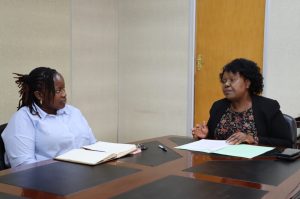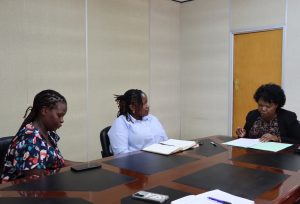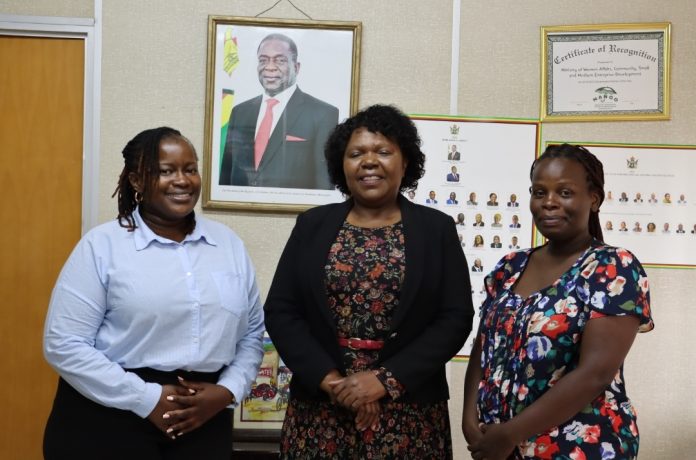INTERVIEW by ILYANA SITHOLE and BRYNA CHADOKA, Zimba Wave Media.
Advocating for girls, young women and women has usually been associated with pressure groups like Shamwari Yemwanasikana, Women for Economic and Social Empowerment, Childline among others and overshadows the government.
Ministers or Permanent Secretaries usually speak in support or in opposition without their emotions but on behalf of the government. However, we were astonished by how we evoked the emotions of the Permanent Secretary after formally greeting and introducing ourselves to each other.
The approachable, cheerful, positive, team player had a lot to share about her ministry.
 Zimba Wave’s Bryna Chadoka with the Permanent Secretary Dr Mavis Sibanda.
Zimba Wave’s Bryna Chadoka with the Permanent Secretary Dr Mavis Sibanda.
BC: What makes you want to come to work everyday?
Dr. MS: First and foremost, this is a very interesting ministry, before I came here I didn’t know much except about SMEs (you know I was the PS at Industry and commerce). So I knew about SMEs but the women affairs I had to learn, my colleagues had however thought I was coming to rest but I myself was in for a great surprise. I realized the President was a very wise man (the wisdom of Solomon) for putting women affairs and SMEs together, it’s a ministry which is the entry point of uplifting livelihoods. My greatest motivation for coming to work is the understanding that there is work that needs to be done to change the lives of the Zimbabwean communities, women and SMEs who constitute the majority of the population. My work is about empowerment of 52% of the population and development of over 3,4 million SMEs as well as cooperative and community development and this demonstrates how this ministry is inclusive, key and strategic in the development of this country and attainment of vision 2030. So I look forward to helping girls, young women and women and I ask myself what can I do to improve their livelihoods. Talking to women with a background like mine, sharing with them that life can change.
BC: What does the ministry have in store for women?
Dr. MS: The mandate of the Ministry is to socially and economically empower women and girls in order to achieve gender equality, reduce Gender Based Violence and poverty and improve participation of women in all spheres of life.This is an inclusive approach to development and is in line with vision 2030 of leaving no place and no man behind. (So i will say that is a petty question). Well, the ministry has empowered a lot of women and girls through various programmes and continues to empower them every day though not enough information about what they do is out there.
Investing in women’s economic empowerment through programmes like Women Development Fund, Women Empowerment Clubs, Market Access, Capacity Building of Women Entrepreneurship, Broad Based Women Economic Empowerment Framework and Value Chain Development have set a direct path towards gender equality, poverty eradication and inclusive economic growth.
With a credit facility that has no collateral security requirements and a 10% low interest rate about 4000 projects have been funded and more than 20000 women including those from grassroot level have benefitted to date.
To promote inclusive development a number of clubs have been put in place in rural areas. The thrust is on income generation and promotes inclusive development. The clubs are also capacitated to grow into SMEs or Cooperatives. The clubs are meant to be the vanguard of development in rural areas and all ministries will have a permanent channel for programmes they wish to be implemented. To date over 2000 clubs have been established and about 18000 women were trained in areas such as entrepreneurship, record keeping, business management and development, leadership, group dynamic, sources of financing, financial literacy, growth strategies, importance of hygiene during processing of products, value addition, baking by and detergents making.
In 2024, the ministry will continue to promote women’s access to markets through exposing their products to local, regional and international trade fairs, shows and expos. The ministry is also engaging the private sector and PRAZ in an effort to promote participation of women in supply chains. In 2023, 10078 women were facilitated to expose their products at fairs, shows and exhibitions whilst over 17000 were registered on the COMESA online platform to access business information, markets and training.
Over 9000 women have been trained throughout different provinces in disciplines such as technical, trade, business and life skills. With over 100 of them helped to link with large corporates for purposes of supplying goods and services. There is also a framework in place which guides in the implementation of empowerment programmes that is being reviewed. The draft report has been finalized and validation of the report will be done this year.
Working with a variety of partners a Madora processing plant was established for 21 women in Beitbridge in 2019. In 2022, a gold milling plant was established for 125 women in Guruve. 2024, the ministry will in February start construction of the HaunaWomen’s Fruit and Vegetable Processing Plant which is expected to create employment for 1000 women and improve farmers income. The ministry is also planning to establish a Bulawayo Manufacturing Center and Safe Markets for survivors of GBV.
The programmes by the ministry are set to promote women’s ability to secure decent jobs and accumulate assets from grassroot level. The ministry will embark on a programme to promote Menstrual Health Hygiene and train women and girls to provide affordable sanity. This is as a result of challenges and concerns that were raised by community based officers after they carried out community based surveys on issues that needed to be addressed urgently as it was noted that girls in rural areas can miss 5 days of school because of mensuration.
The Ministry is also facilitating women to access health services such as cervical and breast cancer screening, sexual and reproductive health information. An average of 5000 women are targeted.
 L to R Zimba Wave’s Journalist Ilyana Sithole ,Bryna Chadoka with the Permanent Secretary Dr Mavis Sibanda.
L to R Zimba Wave’s Journalist Ilyana Sithole ,Bryna Chadoka with the Permanent Secretary Dr Mavis Sibanda.
IS: What does the ministry do about young women and girls? (The girl child issue)
Dr. MS: Fight against drug and substance abuse. The ministry through its devolved structure disseminated information to fight against drug and substance abuse in the whole of government approach. The ministry works with CSOs in the dissemination of information in relation to dangers of using drugs and substance up to ward level.
Campaigns like the African Union Campaign to End Child Marriages, 18+ campaign, “Give us books, not Husbands” campaign, “Girls not Brides” campaign and “Give me a chance, I am not a wife campaign have been used to fight against child marriages by the ministry and its’ partners. Rape is not the only form of abuse faced by children but being forced into marriage is also another form of abuse against girls and young women.
The ministry has an Action Plan on Ending Child Marriages and says it is being circulated to all communities so that there will be an end to child marriages. This ministry is responsible for families and communities, it is our duty to encourage good behavior, so they have training programs with girls and young women.
IS: What is the ministry’s take on violence against women?
Dr. MS: The Ministry maintains a zero tolerance on Gender Based Violence (GBV). Violence against women and girls constitute a gross violation of their rights and this has to be avoided. GBV is not limited to women and girls but also boys and men and is wrong in every way. In the fight against GBV there have been dialogues with community leaders as a measure to identify the root cause of GBV because the leaders are usually the first responders in these cases. Information gathered from engagement with leaders helps put in place measures to prevent and respond to violence.
Also through media, awareness is raised and commemoration of UN Calendar events for women rights which always have a theme related to protection, prevention and response to GBV are recognized by the ministry to address GBV while raising awareness and the need to prevent the ill. The ministry has established One Stop Centres and Safe Shelters to provide comprehensive GBV services to survivors.
IS: What about your personal take on GBV?
Dr. MS: It’s evil. As a sister, aunt, mother and in any relation I hold it remains evil and always evokes the counselor in her whenever need arises to create awareness of what it does to families. Even if it was my son who I love so much I would never tolerate. GBV is a cowardice act, no matter you saw your partner in bed with someone GBV is not necessary. Even if it was my beloved brother whom I can give a kidney to if in need of it I would tell him he is a coward for beating a woman.
IS: Lastly, I would like to find out if your ministry is going to do anything about the issue of Yeukai Dandara?
Dr. MS: We will definitely leave no stone unturned. We have community officers in every district and I know by the end of day today there will be a message coming through on WhatsApp or a call giving an update on the issue.
newsroom@zimbawavemedia.co.uk




